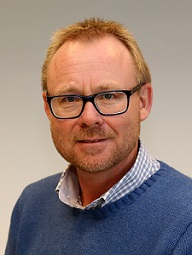HoD News - 4 December 2017

Dear Colleagues
Since I commenced as acting head of department three months ago, I have been busy on many fronts, trying to get an overview of the department, Aarhus BSS, as well as the entire AU from an administrative angle that was new to me.
Following the years with discontinuity in the management of our department, this has been somewhat challenging. I would like to thank everybody who has contributed and assisted me in overcoming this challenge so far; this includes the management team and so many other colleagues - too many to mention. I really appreciate your help and support. I hope that I will be given the opportunity to continue this work in the coming years, because we have only just started.
In this start-up phase my calendar has been very tight, and I may have been somewhat invisible so far. I will strive to be more visible in the future as the fog clears. I plan to meet with department members and the sections, research units, and centres on a regular basis, and I would like to be transparent about many of the things that are going on within the management of the department. Also, via this column, I will try to keep you updated on the themes and topics which are currently on the management agenda.
The delineation of some new sections is now in place, and new (Claus Holm and Hans Jørn Juhl) and continuing (Kim Allan Andersen, Tor Eriksson and Marianne Simonsen) section heads are in office. I would like to thank the former section heads Tom Engsted and Niels Peter Mols for their excellent and collaborative work.
For personal reasons, Marianne Simonsen has decided to step down as head of the Labour and Public Policy Section by 31 December. I very much regret Marianne’s decision. She has done a fantastic job as section head, and our collaboration has been excellent. Until I have found a permanent solution, Nabanita Datta Gupta has agreed to take over the position as LPP-section head. I am very grateful for that. Nabanita is already in the management team, heading the tasks in relation to talent development, and from 1 February she will also be heading the tasks relating to PhD.
I very much appreciate that Mogens Dilling-Hansen, Thomas Quistgaard Pedersen and Bo Sandemann Rasmussen have joined the management team as deputy heads with our teaching and education portfolio as their main responsibility area, and that Lene Bavnbek Enevoldsen remains as section head of the administration.
Margit Sommer now has a part time position and will continue with some support tasks, including the practical work in connection with the annual job market arrangements. Anne Charlotte la Cour has agreed to become my personal assistant in a full time position; she will start in her new job when a replacement for her current tasks has been found.
During the past few months, professorship and associate professorship openings have been filled, and we are expecting three new colleagues to join our faculty in 2018 following these openings. More information will follow soon. Currently, two professorship openings in Economics are under assessment, and we have a deadline for an associate professorship opening in mid January. Also, the
department will be represented at the annual AEA-ASSA meetings in Philadelphia 5-7 January 2018 to interview potential job market candidates. The department will primarily consider recruitment in macro and international economics, industrial organisation and trade, accounting and finance, and in econometrics and business statistics. Several positions will be co-funded by external funds.
I am also glad to announce that as of 1 February Allan Würtz will return to the department after almost three years at the Department of Political Science where he will continue to have some teaching commitments.
During 2018 the department management will primarily focus on manoeuvring and setting the course of the ship.
I regret to say that in the spring it will become necessary that some of you move office due to the establishment of the new sections. Our department is generally challenged by shortage of office space, which restricts the degrees of freedom in finding optimal locations for the various units that we have at the department.
We face many more challenges. Following the merger, we need to focus more intensively on how we coordinate and allocate courses across the broad education portfolio of our department, and we need to exploit our teaching resources more efficiently. This exercise includes considerations regarding the future norm system of the department.
We are challenged by too many students dropping out the first year of some degree programs, and we should try to identify the sources of dropouts and make the necessary adjustments where needed.
We also need to increase our focus on attracting external research funding, and we should be particularly attentive towards attracting funding more evenly across the research fields and sections of the department. The department has a poor track of getting EU and ERC funding; I believe that given the excellent quality of our department faculty we can do much better. One third of our revenue available for salaries for teaching and research positions originate from external funding. This is a significant number, and we are thus very sensitive to external funding volatility. Revenue from our education programmes, on the other hand, is relatively stable.
We need to address getting more publications in top journals by appropriate incentive arrangements. To offer "cake" is a small element of the incentive scheme. However, eventually I will reintroduce "cake" when people have good publications, but first we should reconsider the ECON journal list and what we mean by good journals in order not to introduce a distorting publication behaviour.
I will be looking very much forward to discussing all these and other issues with you in the coming years.
Niels